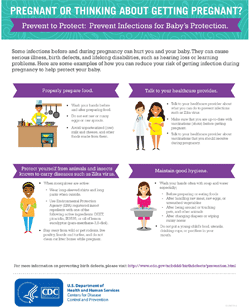Prevent Birth Defects: Talk to Your Doctor
 Some infections before and during pregnancy can hurt both you and your baby. Talk to your healthcare provider about how to reduce your risk of getting an infection during pregnancy.
Some infections before and during pregnancy can hurt both you and your baby. Talk to your healthcare provider about how to reduce your risk of getting an infection during pregnancy.
Some infections before and during pregnancy can cause serious illness, birth defects, and lifelong disabilities, such as hearing loss or learning problems. Women can lower their risk of having a baby born with a birth defect by following some basic health guidelines throughout their reproductive years. This is important because many birth defects happen very early during pregnancy, sometimes before a woman even knows that she is pregnant. We encourage all women and their loved ones to Prevent to Protect: Prevent infections for baby’s protection.
Topics to Discuss With Your Healthcare Provider
- Zika: The Zika virus can be passed from a pregnant woman to her developing baby and cause birth defects. If you are pregnant or trying to become pregnant, do not visit areas with Zika. Talk to your doctor about your travel plans if you are planning to get pregnant in the near future. CDC recommends waiting to get pregnant after traveling to an area with Zika. For more information about Zika, visit the CDC’s Zika Virus website.
- Sexually Transmitted Diseases (STDs): STDs may have serious effects on both you and your developing baby. You can prevent STDs by being in a long-term monogamous relationship with a partner who has been tested for STDs and has a negative test result, and by using latex condoms the right way every time you have sex. Talk to your healthcare provider about more ways to prevent STDs, before and during pregnancy. For more information about STDs and pregnancy, visit CDC’s STDs website.
- Syphilis: If you are pregnant and have syphilis, you can give the infection to your developing baby. Having syphilis can lead to a low birth weight baby. It can also make it more likely you will deliver your baby too early or stillborn. To protect your developing baby, you should be tested for syphilis during your pregnancy and at delivery and receive immediate treatment if you test positive. For more information about syphilis, visit CDC’s syphilis webpage.
- Vaccines: Whether you are pregnant, planning a pregnancy, or just had a baby, there are vaccines you may need to protect yourself and your baby. For example, CDC recommends that you get a whooping cough and a flu vaccine during each pregnancy. Make sure that you are up-to-date with vaccinations before getting pregnant and talk to your healthcare provider about any other vaccines that you may need during pregnancy. For more information about vaccines and pregnancy, visit CDC’s Pregnancy and Vaccination website.
- Medications: You may develop a bacterial infection during pregnancy, such as a urinary tract infection (infection of the bladder and kidneys) , which requires treatment with an antibiotic. While some medicines are known to be safe and others are harmful when taken during pregnancy, the safety or risk of most medicines is not known. Talk to your healthcare provider before taking any prescription or over-the-counter medicines, or dietary or herbal supplements during pregnancy. For more information about medicine use in pregnancy, visit CDC’s Treating for Two website.
Learn more ways to prevent infections in pregnancy.
CDC Activities: Birth Defects
CDC works to identify the causes of birth defects, find opportunities to prevent them, and improve the health of those living with birth defects.
- Tracking: CDC is tracking the spread of Zika virus and studying the links between Zika and birth defects. In addition, CDC funds 14 states to track major birth defects. State systems use the data to help guide birth defects prevention activities and refer children affected by birth defects to needed services.
- Research: CDC funds the Centers for Birth Defects Research and Prevention, which collaborate on large studies such as the National Birth Defects Prevention Study (births 1997-2011) and the Birth Defects Study To Evaluate Pregnancy exposureS, also called BD-STEPS, (began in 2014). Researchers on these studies work to identify things that may increase or decrease the risk of having a baby with a birth defect. Other CDC research focuses on health services use and long-term health outcomes for people who have birth defects, and the costs of birth defects.
- Prevention: CDC and its partners use what they learn through research to help prevent birth defects.
- Folic acid: Getting enough folic acid (a B vitamin) before and during the early weeks of pregnancy greatly reduces the risk of serious birth defects of the brain and spine known as spina bifida and anencephaly. A 1996 policy to add folic acid to many foods helps to prevent many of these birth defects.
- Preconception care: CDC and its partners also work to educate women about the importance of preconception (before pregnancy) health through a campaign called Show Your Love.
- Improving the lives of individuals with birth defects: Babies who have birth defects often need special care and treatment to survive and thrive. Birth defects tracking systems provide one way to identify and refer children for services they need as early as possible. Early intervention (treatment for delays in physical and mental development, and in speech/language) is vital to help babies born with a birth defect reach their full potential.
- Page last reviewed: January 25, 2017
- Page last updated: January 25, 2017
- Content source:
- National Center on Birth Defects and Developmental Disabilities
- Page maintained by: Office of the Associate Director for Communication, Digital Media Branch, Division of Public Affairs




 ShareCompartir
ShareCompartir
